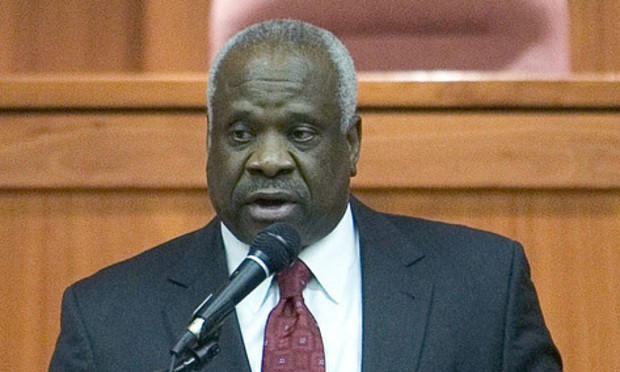SCOTUS Blocks Execution in Georgia Over a Juror's Racial Bias
“One might wonder why the Court engages in this pointless exercise,” Justice Clarence Thomas wrote in his dissent. “The only possible explanation is its concern with the 'unusual facts' of this case, specifically a juror affidavit that expresses racist opinions about blacks. The opinions in the affidavit are certainly odious. But their odiousness does not excuse us from doing our job correctly, or allow us to pretend that the lower courts have not done theirs.”
January 08, 2018 at 02:25 PM
4 minute read

Racial bias of a juror who questioned whether black people have souls led the U.S. Supreme Court on Monday morning to block the execution of a Georgia man.
The highest court issued a two-and-a-half page per curiam order Monday, returning the case of convicted killer Keith Tharpe to the U.S. Court of Appeals for the Eleventh Circuit.
Justice Clarence Thomas, joined by Justices Samuel Alito and Neil Gorsuch, wrote a 13-page dissent, reasoning that Tharpe is going to die anyway. Thomas, a Georgia native, said that Tharpe could not prove that bias affected the jury's decision to approve the death penalty.
“One might wonder why the court engages in this pointless exercise,” Thomas wrote. “The only possible explanation is its concern with the 'unusual facts' of this case, specifically a juror affidavit that expresses racist opinions about blacks. The opinions in the affidavit are certainly odious. But their odiousness does not excuse us from doing our job correctly, or allow us to pretend that the lower courts have not done theirs.”
The odious opinion came from a white juror named Barney Gattie, who has since died. This is what the court majority opinion said about that juror: “Tharpe produced a sworn affidavit, signed by Gattie, indicating Gattie's view that 'there are two types of black people: 1. Black folks and 2. Niggers'; that Tharpe, 'who wasn't in the 'good' black folks category in my book, should get the electric chair for what he did'; that '[s]ome of the jurors voted for death because they felt Tharpe should be an example to other blacks who kill blacks, but that wasn't my reason'; and that, '[a]fter studying the Bible, I have wondered if black people even have souls.'”
The majority reversed the Eleventh Circuit's denial of Tharpe's motion to reopen his federal habeas corpus proceeding based on that juror's bias.
“Gattie's remarkable affidavit—which he never retracted—presents a strong factual basis for the argument that Tharpe's race affected Gattie's vote for a death verdict,” the majority ruled. “At the very least, jurists of reason could debate whether Tharpe has shown by clear and convincing evidence that the state court's factual determination was wrong. The Eleventh Circuit erred when it concluded otherwise.”
The majority left room for the possibility that Thomas could be right.
“It may be that, at the end of the day, Tharpe should not receive a COA,” the majority wrote, referring to the requested certificate of appealability. “But on the unusual facts of this case, the Court of Appeals' review should not have rested on the ground that it was indisputable among reasonable jurists that Gattie's service on the jury did not prejudice Tharpe.”
Thomas called the “unusual facts” argument an attempt to justify a wrong ruling.
“The court must be disturbed by the racist rhetoric in that affidavit, and must want to do something about it,” Thomas said. “But the court's decision is no profile in moral courage. By remanding this case to the Court of Appeals for a useless do-over, the court is not doing Tharpe any favors. And its unusual disposition of his case callously delays justice for Jaquelin Freeman, the black woman who was brutally murdered by Tharpe 27 years ago. Because this court should not be in the business of ceremonial handwringing, I respectfully dissent.”
Tharpe was represented by the executive director of the Georgia Resource Center,
Brian Kammer.
“We are thankful that the U.S. Supreme Court recognized the serious implications for fundamental fairness of the clear evidence of racial animus on the part of one of the jurors who sentenced Mr. Tharpe to death,” Kammer said in a news release Monday. “We look forward to pressing Mr. Tharpe's case in the Eleventh Circuit per the U.S. Supreme Court's direction.”
Sabrina Graham of the office of Georgia Attorney General Chris Carr represented the state. Carr said through a spokeswoman by email Monday, “We've received the decision, and if requested, we'll address the Court's concerns in subsequent proceedings.”
This content has been archived. It is available through our partners, LexisNexis® and Bloomberg Law.
To view this content, please continue to their sites.
Not a Lexis Subscriber?
Subscribe Now
Not a Bloomberg Law Subscriber?
Subscribe Now
NOT FOR REPRINT
© 2025 ALM Global, LLC, All Rights Reserved. Request academic re-use from www.copyright.com. All other uses, submit a request to [email protected]. For more information visit Asset & Logo Licensing.
You Might Like
View All
12-Partner Team 'Surprises' Atlanta Firm’s Leaders With Exit to Launch New Reed Smith Office
4 minute read
After Breakaway From FisherBroyles, Pierson Ferdinand Bills $75M in First Year
5 minute read
On the Move: Freeman Mathis & Gary Adds Florida Partners, Employment Pro Joins Jackson Lewis
6 minute readTrending Stories
- 1White & Case KOs Claims Against Voltage Inc. in Solar Companies' Trade Dispute
- 2Avantia Publicly Announces Agentic AI Platform Ava
- 3Shifting Sands: May a Court Properly Order the Sale of the Marital Residence During a Divorce’s Pendency?
- 4Joint Custody Awards in New York – The Current Rule
- 5Paul Hastings, Recruiting From Davis Polk, Adds Capital Markets Attorney
Who Got The Work
J. Brugh Lower of Gibbons has entered an appearance for industrial equipment supplier Devco Corporation in a pending trademark infringement lawsuit. The suit, accusing the defendant of selling knock-off Graco products, was filed Dec. 18 in New Jersey District Court by Rivkin Radler on behalf of Graco Inc. and Graco Minnesota. The case, assigned to U.S. District Judge Zahid N. Quraishi, is 3:24-cv-11294, Graco Inc. et al v. Devco Corporation.
Who Got The Work
Rebecca Maller-Stein and Kent A. Yalowitz of Arnold & Porter Kaye Scholer have entered their appearances for Hanaco Venture Capital and its executives, Lior Prosor and David Frankel, in a pending securities lawsuit. The action, filed on Dec. 24 in New York Southern District Court by Zell, Aron & Co. on behalf of Goldeneye Advisors, accuses the defendants of negligently and fraudulently managing the plaintiff's $1 million investment. The case, assigned to U.S. District Judge Vernon S. Broderick, is 1:24-cv-09918, Goldeneye Advisors, LLC v. Hanaco Venture Capital, Ltd. et al.
Who Got The Work
Attorneys from A&O Shearman has stepped in as defense counsel for Toronto-Dominion Bank and other defendants in a pending securities class action. The suit, filed Dec. 11 in New York Southern District Court by Bleichmar Fonti & Auld, accuses the defendants of concealing the bank's 'pervasive' deficiencies in regards to its compliance with the Bank Secrecy Act and the quality of its anti-money laundering controls. The case, assigned to U.S. District Judge Arun Subramanian, is 1:24-cv-09445, Gonzalez v. The Toronto-Dominion Bank et al.
Who Got The Work
Crown Castle International, a Pennsylvania company providing shared communications infrastructure, has turned to Luke D. Wolf of Gordon Rees Scully Mansukhani to fend off a pending breach-of-contract lawsuit. The court action, filed Nov. 25 in Michigan Eastern District Court by Hooper Hathaway PC on behalf of The Town Residences LLC, accuses Crown Castle of failing to transfer approximately $30,000 in utility payments from T-Mobile in breach of a roof-top lease and assignment agreement. The case, assigned to U.S. District Judge Susan K. Declercq, is 2:24-cv-13131, The Town Residences LLC v. T-Mobile US, Inc. et al.
Who Got The Work
Wilfred P. Coronato and Daniel M. Schwartz of McCarter & English have stepped in as defense counsel to Electrolux Home Products Inc. in a pending product liability lawsuit. The court action, filed Nov. 26 in New York Eastern District Court by Poulos Lopiccolo PC and Nagel Rice LLP on behalf of David Stern, alleges that the defendant's refrigerators’ drawers and shelving repeatedly break and fall apart within months after purchase. The case, assigned to U.S. District Judge Joan M. Azrack, is 2:24-cv-08204, Stern v. Electrolux Home Products, Inc.
Featured Firms
Law Offices of Gary Martin Hays & Associates, P.C.
(470) 294-1674
Law Offices of Mark E. Salomone
(857) 444-6468
Smith & Hassler
(713) 739-1250







